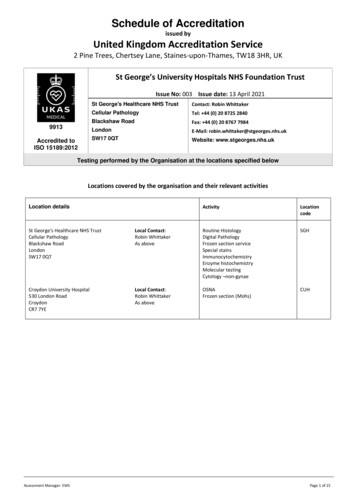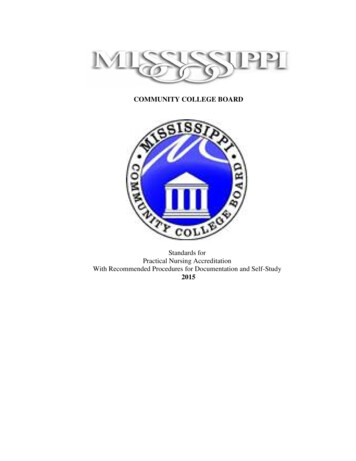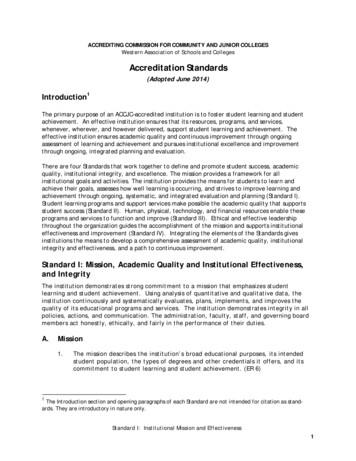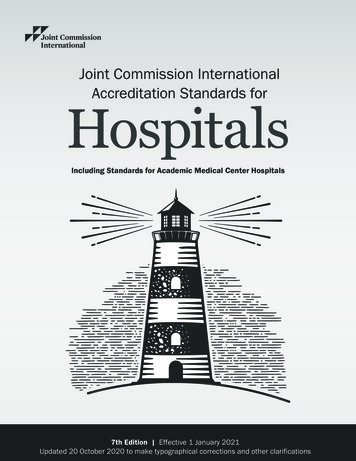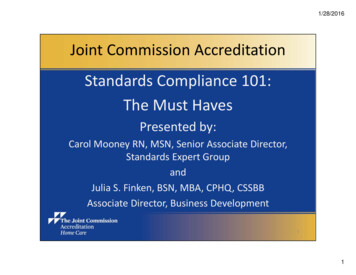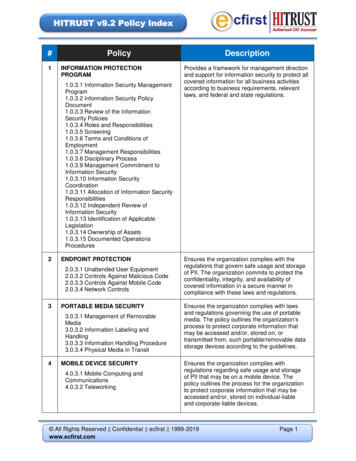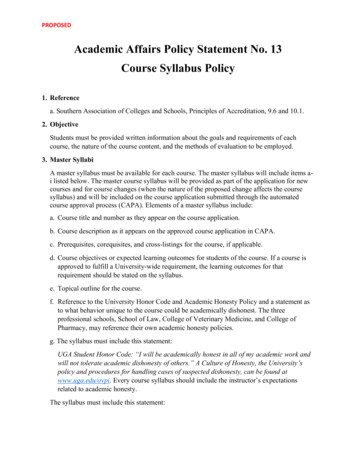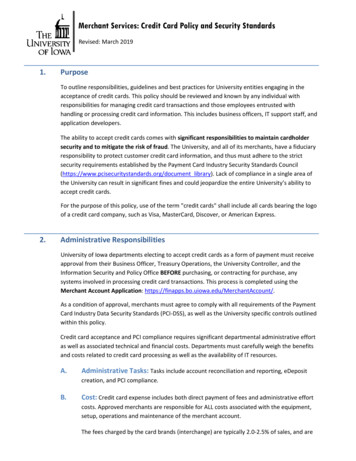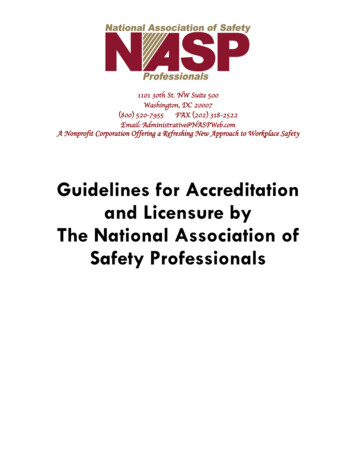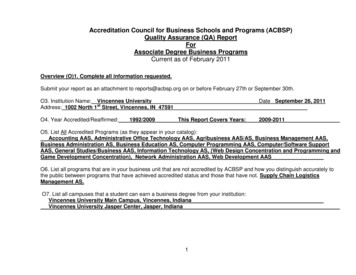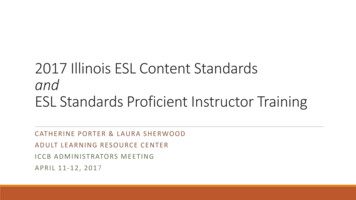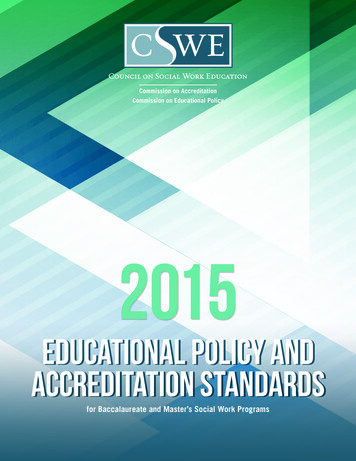
Transcription
XXCommission on AccreditationCommission on Educational Policy2015Educational Policy andAccreditation Standardsfor Baccalaureate and Master’s Social Work Programs12015 Educational Policy and Accreditation Standards
Developed by the Council on Social Work Education (CSWE) Commission on Educational Policy andthe CSWE Commission on Accreditation; Educational Policy approved by the CSWE Board of Directors on March 20, 2015;Accreditation Standards approved by the CSWE Commission on Accreditation on June 11, 2015.Copyright 2015 Council on Social Work Education
contentsIntroduction. 4Explicit Curriculum. 11Educational Policy 2.0—Generalist Practice.11Purpose: Social Work Practice,Education, and Educational Policy andAccreditation Standards. 5Accreditation Standard B2.0—Generalist Practice.11Competency-Based Education. 6Accreditation Standard M2.1—Specialized Practice.12Social Work Competencies. 7Accreditation Standard M2.0—Generalist Practice.11Educational Policy M2.1—Specialized Practice.12Educational Policy 2.2—Signature Pedagogy:Field Education.12Competency 1: Demonstrate Ethicaland Professional Behavior.7Accreditation Standard 2.2—Field Education.13Competency 2: Engage Diversity andDifference in Practice.7Implicit Curriculum. 14Competency 3: Advance Human Rights and Social, Economic,and Environmental Justice.7Accreditation Standard 3.0—Diversity.14Competency 4: Engage In Practice-informedResearch and Research-informed Practice.8Competency 5: Engage in Policy Practice.8Competency 6: Engage with Individuals, Families,Groups, Organizations, and Communities.8Competency 7: Assess Individuals, Families, Groups,Organizations, and Communities.9Competency 8: Intervene with Individuals, Families, Groups,Organizations, and Communities.9Competency 9: Evaluate Practice with Individuals, Families,Groups, Organizations, and Communities.9Educational Policy 3.0—Diversity.14Educational Policy 3.1—Student Development.14Accreditation Standard 3.1—Student Development:Admissions; Advisement, Retention, and Termination;and Student Participation.14Admissions.14Advisement, retention, and termination.15Student participation.15Educational Policy 3.2—Faculty.15Accreditation Standard 3.2—Faculty.15Educational Policy 3.3—Administrative andGovernance Structure.16Program Mission and Goals. 10Accreditation Standard 3.3—Administrative Structure.16Educational Policy 1.0—Program Mission and Goals.10Educational Policy 3.4—Resources.17Values. 10Accreditation Standard 3.4—Resources.17Program Context. 10Accreditation Standard 1.0—Program Mission and Goals.10Assessment. 18Educational Policy 4.0—Assessment ofStudent Learning Outcomes.18Accreditation Standard 4.0—Assessment.182015 Educational Policy and Accreditation Standards3
IntroductionAccreditation is a system for recognizing educational institutions and professional programsaffiliated with those institutions as having a level of performance, integrity, and quality thatentitles them to the confidence of the educational community and the public they serve.The Commission on Accreditation (COA) of the Council on Social Work Education (CSWE)is recognized by the Council for Higher Education Authority to accredit baccalaureate andmaster’s degree programs in social work education in the United States and its territories.The COA is responsible for formulating, promulgating, and implementing the accreditationstandards for baccalaureate and master’s degree programs in social work, for ensuring thestandards define competent preparation, and for confirming that accredited social workprograms meet the standards. To this end, CSWE’s COA administers a multistep accreditationprocess that involves program self-studies and benchmarks, site visits, and COA reviews.The accreditation review process provides professional judgments on the quality of a social work education program in aninstitution. These findings are based on applying the Educational Policy and Accreditation Standards (EPAS) promulgatedby the Commission on Educational Policy (COEP) and the COA. The essential purpose of the accreditation process is toprovide a professional judgment of the quality of the program offered and to encourage continual improvement. Moreover,systematic examination of compliance with established standards supports public confidence in the quality of professionalsocial work education and in the competence of social work practice.EPAS Revision ProcessThe COA and the COEP are responsible for revising the EPAS. The revision takes place in accordance with the CSWEbylaws, which mandate that the policy statement be reviewed by COEP “at periodic intervals not to exceed 7 years."CSWE’s recognition by the Council for Higher Education Authority also requires that accreditors have a process wherebystandards are reviewed periodically by the COA.The most recent standards review process took more than 5 years and resulted in three drafts issued for public review andcomment. The intent of the COA and the COEP was to solicit feedback from as many constituents as possible in as manyways as possible. The COEP and the COA would like to thank the programs, individuals, organizations, and communities ofinterest that provided feedback on all of the drafts.The educational policy, which details the new social work competencies for the 2015 EPAS, was developed by COEP andapproved by the CSWE Board of Directors on March 20, 2015. The accreditation standards were developed and approvedby the COA on June 11, 2015. Programs that have reaffirmation reviews in October 2017 or later will use the 2015 EPASto prepare their self-studies. Programs applying for candidacy in 2016 and beyond would use the 2015 EPAS for theirbenchmark documents.For updated information about the 2015 EPAS, please visit www.cswe.org/Accreditation or send an e-mail toaccreditation@cswe.org.July 20154Educational Policy and Accreditation Standards
Purpose: Social Work Practice, Education, andEducational Policy and Accreditation StandardsThe purpose of the social work profession is to promote human and community well-being.Guided by a person-in-environment framework, a global perspective, respect for humandiversity, and knowledge based on scientific inquiry, the purpose of social work is actualizedthrough its quest for social and economic justice, the prevention of conditions that limithuman rights, the elimination of poverty, and the enhancement of the quality of life for allpersons, locally and globally.Social work educators serve the profession through their teaching, scholarship, and service. Social work education atthe baccalaureate, master’s, and doctoral levels shapes the profession’s future through the education of competentprofessionals, the generation of knowledge, the promotion of evidence-informed practice through scientific inquiry, and theexercise of leadership within the professional community. Social work education is advanced by the scholarship of teachingand learning, and scientific inquiry into its multifaceted dimensions, processes, and outcomes.The Council on Social Work Education (CSWE) uses the Educational Policy and Accreditation Standards (EPAS) toaccredit baccalaureate and master’s level social work programs. EPAS supports academic excellence by establishingthresholds for professional competence. It permits programs to use traditional and emerging models and methodsof curriculum design by balancing requirements that promote comparable outcomes across programs with a level offlexibility that encourages programs to differentiate.EPAS describe four features of an integrated curriculum design: (1) program mission and goals, (2) explicit curriculum, (3)implicit curriculum, and (4) assessment. The educational policy and the accreditation standards are conceptually linked toeach other. Educational Policy describes each curriculum feature. Accreditation standards are derived from the Educationalpolicy and specify the requirements used to develop and maintain an accredited social work program at the baccalaureate (B)or master’s (M) level.It permits programs to use traditional and emerging models and methodsof curriculum design by balancing requirements that promote comparableoutcomes across programs with a level of flexibility that encouragesprograms to differentiate.2015 Educational Policy and Accreditation Standards5
Competency-Based EducationIn 2008 CSWE adopted a competency-based education framework for its EPAS. As inrelated health and human service professions, the policy moved from a model of curriculumdesign focused on content (what students should be taught) and structure (the format andorganization of educational components) to one focused on student learning outcomes. Acompetency-based approach refers to identifying and assessing what students demonstrate inpractice. In social work this approach involves assessing students’ ability to demonstrate thecompetencies identified in the educational policy.Competency-based education rests upon a shared view of the nature of competence in professional practice. Socialwork competence is the ability to integrate and apply social work knowledge, values, and skills to practice situationsin a purposeful, intentional, and professional manner to promote human and community well-being. EPAS recognizesa holistic view of competence; that is, the demonstration of competence is informed by knowledge, values, skills, andcognitive and affective processes that include the social worker’s critical thinking, affective reactions, and exercise ofjudgment in regard to unique practice situations. Overall professional competence is multi-dimensional and composedof interrelated competencies. An individual social worker’s competence is seen as developmental and dynamic,changing over time in relation to continuous learning.Competency-based education is an outcomes-oriented approach to curriculum design. The goal of the outcomes approachis to ensure that students are able to demonstrate the integration and application of the competencies in practice. In EPAS,social work practice competence consists of nine interrelated competencies and component behaviors that are comprisedof knowledge, values, skills, and cognitive and affective processes.Using a curriculum design that begins with the outcomes, expressed as the expected competencies, programs developthe substantive content, pedagogical approach, and educational activities that provide learning opportunities forstudents to demonstrate the competencies.Assessment of student learning outcomes is an essential component of competency-based education. Assessment providesevidence that students have demonstrated the level of competence necessary to enter professional practice, which in turn showsprograms are successful in achieving their goals. Assessment information is used to improve the educational program and themethods used to assess student learning outcomes.Programs assess students’ demonstration of competence. The assessment methods used by programs gather data thatserve as evidence of student learning outcomes and the demonstration of competence. Understanding social work practiceis complex and multi-dimensional, the assessment methods used by programs and the data collected may vary by context.Social work competence is the ability to integrate and apply social workknowledge, values, and skills to practice situations in a purposeful, intentional,and professional manner to promote human and community well-being.62015 Educational Policy and Accreditation Standards
Social Work CompetenciesThe nine Social Work Competencies are listed below. Programs may add competencies that areconsistent with their mission and goals and respond to their context. Each competency describes theknowledge, values, skills, and cognitive and affective processes that comprise the competency at thegeneralist level of practice, followed by a set of behaviors that integrate these components. Thesebehaviors represent observable components of the competencies, while the preceding statementsrepresent the underlying content and processes that inform the behaviors.Competency 1: Demonstrate Ethical and Professional BehaviorSocial workers understand the value base of the profession and its ethical standards, as well as relevant laws and regulations that mayimpact practice at the micro, mezzo, and macro levels. Social workers understand frameworks of ethical decision-making and howto apply principles of critical thinking to those frameworks in practice, research, and policy arenas. Social workers recognize personalvalues and the distinction between personal and professional values. They also understand how their personal experiences andaffective reactions influence their professional judgment and behavior. Social workers understand the profession’s history, its mission,and the roles and responsibilities of the profession. Social Workers also understand the role of other professions when engaged ininter-professional teams. Social workers recognize the importance of life-long learning and are committed to continually updating theirskills to ensure they are relevant and effective. Social workers also understand emerging forms of technology and the ethical use oftechnology in social work practice. Social workers: make ethical decisions by applying the standards of the NASW Code of Ethics, relevant laws and regulations, models for ethicaldecision-making, ethical conduct of research, and additional codes of ethics as appropriate to context; use reflection and self-regulation to manage personal values and maintain professionalism in practice situations; demonstrate professional demeanor in behavior; appearance; and oral, written, and electronic communication; use technology ethically and appropriately to facilitate practice outcomes; and use supervision and consultation to guide professional judgment and behavior.Competency 2: Engage Diversity and Difference in PracticeSocial workers understand how diversity and difference characterize and shape the human experience and are critical to theformation of identity. The dimensions of diversity are understood as the intersectionality of multiple factors including but not limitedto age, class, color, culture, disability and ability, ethnicity, gender, gender identity and expression, immigration status, marital status,political ideology, race, religion/spirituality, sex, sexual orientation, and tribal sovereign status. Social workers understand that, asa consequence of difference, a person’s life experiences may include oppression, poverty, marginalization, and alienation as wellas privilege, power, and acclaim. Social workers also understand the forms and mechanisms of oppression and discrimination andrecognize the extent to which a culture’s structures and values, including social, economic, political, and cultural exclusions, mayoppress, marginalize, alienate, or create privilege and power. Social workers: apply and communicate understanding of the importance of diversity and difference in shaping life experiences in practice at themicro, mezzo, and macro levels; present themselves as learners and engage clients and constituencies as experts of their own experiences; and apply self-awareness and self-regulation to manage the influence of personal biases and values in working with diverse clientsand constituencies.Competency 3: Advance Human Rights and Social, Economic, and Environmental JusticeSocial workers understand that every person regardless of position in society has fundamental human rights such as freedom,safety, privacy, an adequate standard of living, health care, and education. Social workers understand the global interconnectionsof oppression and human rights violations, and are knowledgeable about theories of human need and social justice and strategiesto promote social and economic justice and human rights. Social workers understand strategies designed to eliminate oppressivestructural barriers to ensure that social goods, rights, and responsibilities are distributed equitably and that civil, political,environmental, economic, social, and cultural human rights are protected. Social workers:2015 Educational Policy and Accreditation Standards7
SOCIAL W ORK COM PE T E N C IE SCompetency 1: Demonstrate Ethical andProfessional BehaviorCompetency 6: Engage with Individuals, Families,Groups, Organizations, and CommunitiesCompetency 2: Engage Diversity andDifference in PracticeCompetency 7: Assess Individuals, Families,Groups, Organizations, and CommunitiesCompetency 3: Advance Human Rights andSocial, Economic, and Environmental JusticeCompetency 8: Intervene with Individuals,Families, Groups, Organizations, and CommunitiesCompetency 4: Engage In Practice-informedResearch and Research-informed PracticeCompetency 9: Evaluate Practice with Individuals,Families, Groups, Organizations, and CommunitiesCompetency 5: Engage in Policy Practice apply their understanding of social, economic, and environmental justice to advocate for human rights at the individual andsystem levels; and engage in practices that advance social, economic, and environmental justice.Competency 4: Engage In Practice-informed Research and Research-informed PracticeSocial workers understand quantitative and qualitative research methods and their respective roles in advancing a science of social work andin evaluating their practice. Social workers know the principles of logic, scientific inquiry, and culturally informed and ethical approaches tobuilding knowledge. Social workers understand that evidence that informs practice derives from multi-disciplinary sources and multiple waysof knowing. They also understand the processes for translating research findings into effective practice. Social workers: use practice experience and theory to inform scientific inquiry and research; apply critical thinking to engage in analysis of quantitative and qualitative research methods and research findings; and use and translate research evidence to inform and improve practice, policy, and service delivery.Competency 5: Engage in Policy PracticeSocial workers understand that human ri
4 Educational Policy and Accreditation Standards Introduction Accreditation is a system for recognizing educational institutions and professional programs affiliated with those institutions as h
